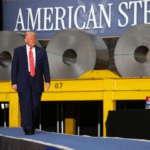OPEC+ Announces Sharp Crude Oil Production Hike for July
OPEC+, led by Saudi Arabia and Russia, has announced a significant increase in oil production for July, marking a dramatic shift in the group’s recent output policy. The decision, revealed on Saturday, signals a coordinated move among eight key member nations — commonly referred to as the “Voluntary Eight” or V8 — to step up supply amid evolving geopolitical and market pressures.
OPEC+ to Add 411,000 Barrels Daily in July
The group will raise production by an additional 411,000 barrels per day starting in July — the same volume that was previously targeted for May and June. This increase is more than three times the amount originally planned and represents the most substantial supply hike the group has made in recent months.
The V8 members had previously implemented daily cuts totaling 2.2 million barrels in an attempt to stabilize global oil prices. However, beginning in early 2025, OPEC+ reversed course, gradually scaling back those cuts and now accelerating the rate of output increases.
The expanded production has had an immediate effect on the global oil market. Crude prices have tumbled to approximately $60 per barrel — the lowest level seen in the past four years. Analysts suggest the latest OPEC+ move could have lasting implications for market balance and global inflation trends.
Energy expert Jorge Leon from Rystad Energy commented, “OPEC+ struck three times: May was a warning, June a confirmation, and July a warning shot.” He emphasized that this isn’t just about market supply but also involves broader political motivations.
OPEC+ Decision Tied to U.S. Political Pressure
According to Leon, the aggressive production hike reflects geopolitical considerations, including influence from Washington. The move appears to align with U.S. President Donald Trump’s ongoing push for lower oil prices, which he believes will help American consumers by reducing fuel costs.
Shortly after taking office, President Trump publicly urged Saudi Arabia to increase oil production to bring down prices at the pump. The recent OPEC+ actions indicate that Riyadh may be responding to that pressure, balancing economic interests with strategic alliances.











